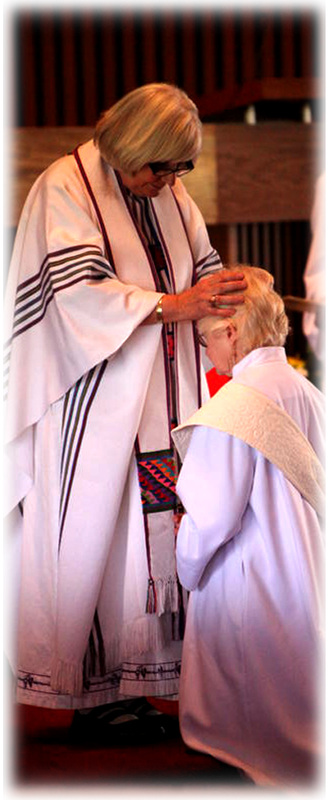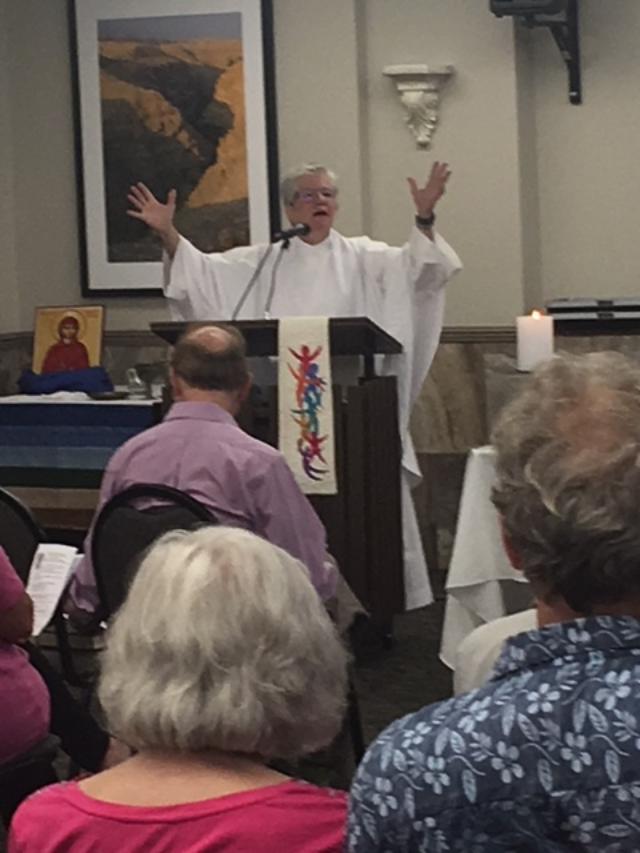1 Kings 1:28–30, 32–35, 38–40;
Ps. 45; Phil 2:6–11, Mark 11:1–11
by Angela N. Meyer, Deacon, RCWP
Good evening, friends.
As we gather on this Palm Sunday, I would like to invite us into a time of faithful questioning.
Our readings today flood us with a vast variety of images, characters, actions, symbols, and theological movement. My first response in reading them was a sense of feeling overwhelmed. I’m not sure how I feel about them, much less how to preach them!
In the very first sentences of our first reading, we are reminded that King David, the same man who the Bible tells us killed Goliath, wrote many of the Psalms, devoted himself to God (YHWH), and expanded the Israelite community, is a murderous adulterer.
The very first words we hear in our holy Liturgy of the Word remind us that our text and tradition are marked by broken commandments and bloodshed. The King promises the woman he cheated with and killed for that her son, Solomon, will become his heir. This is the same line of succession that Jesus will claim.
(Side note: we know nothing about Bathsheba’s participation in this murderous affair. We know that David covets her, sleeps with her, impregnates her, and has her husband killed so that he can marry her, but for all we know, she had no say or consent in the matter. Though she might have. The storyteller does not think it important to say. God strikes down the child begotten of their affair, and we are told Bathsheba weeps. To console her, David sleeps with her again, and this time; Solomon — the heir, is born. It seems the throne is important to the storyteller; however, we get to say what matters to us. What about Bathsheba?)
Why have our lectionary editors reminded us of David’s transgressions before announcing what might otherwise be most important to us on Palm Sunday: the imagery and events of kingly succession? I think the feminist scholars of the Catholic Comprehensive Lectionary have thrown us an important curveball before highlighting Solomon’s kingly procession.
We might gloss over the violent details by telling ourselves this is a tale that was written some 2500 years ago and adopt the stance of so many Christians that the “New Testament” is superior. It’s not violent like that. Jesus was “better.”
I highly advise against this for multiple reasons. First, it is very anti-Jewish and it leads us to wrongly interpreting Jesus outside of his own Jewish context. Secondly, the New Testament depends entirely on its relationship with the so-called “Old.” Thirdly, the “New Testament” is not without its own contradictions, violence, and flaws. Neither is Catholicism, for that matter. We know that all too well.
Finally, the Gospel writers evoke the powerful cultural memory of Solomon’s ride into Jerusalem to strengthen the claim of Jesus’s kingly inheritance. This connection is intentional.
The people sing “Hosana!,” which means, “Save! We pray,” in Aramaic. “Blessed is the coming reign of the ancestral house of David and Bathsheba!”
As Christians, I’m not sure how well we hear these words. “Blessed is the coming reign of the ancestral house of David and Bathsheba!” They are deep reminders of Jesus’ commitment and intentionality for his own community of people: the Israelites, those we now recognize as Jewish.
And what about the leafy branches that people spread on the road in anticipation and celebration of Jesus’ arrival? The ones the Gospel of John specifies as “palms,” which gives us the name for our holy day? Their use echoes a similar celebration in 1 Maccabees:
On the twenty-third day of the second month,[a] in the one hundred and seventy-first year, the Jews entered the citadel with shouts of praise, the waving of palm branches, the playing of harps and cymbals and lyres, and the singing of hymns and canticles, because a great enemy of Israel had been crushed. (1 Macc 13:51).
Who was the great enemy of the Maccabees? The Seleucid Kings, foreign occupiers not so different from the Romans of Jesus’ time.
As Judaism expanded under the reign of the Maccabees, religious differences emerged among Jews, creating theological and ideological divisions between the Hasmoneans, the Pharisees, and the Sadducees. Those differences eventually led to civil war, which weakened Israel politically and led to its conquest by Rome.
This is the context and setting where Jesus enters the city, riding a mule, with Israelites preparing the way with cloaks, green branches, or palm fronds.
So what do we do with this today? It’s so complicated.
(Breathe.)
When I was younger, I absorbed each reading with the attention of someone aching for the Word of God. I understood the Bible as the ultimate source of Truth, and I expected to only receive goodness and straight truths from it. Because God is Good, and Truth is obvious, right?
It took a long time for me, and I suppose for many if not most of us, to begin to grapple with the reality that the Bible is extremely complex. Not all of its words are “good,” and its “truths” aren’t always easy to discern. Perhaps some words are warnings or calls to conscience. Perhaps some serve as reminders of who we are and where we come from. This can provide us a helpful and holy sense of identity, and also a sense of how we can learn from our ancestors and do better.
As we move into Holy Week, we might ask ourselves who this Jesus is that we celebrate, mourn, and await.
Much of Catholicism has been founded on the idea of Jesus as savior. It has also been a religion that has not only ignored but capitalized on the deep problems of patriarchy and womanizing in the Bible.
And yet, today, we sing “Hosana,” and we await the one who saves. The one who bears witness to the history and traditions of the Israelite people. We do so with love, expectancy, and faith because of and despite the stories and religion that have formed us.
And in just a few days, we will celebrate Jesus’ last supper, which he celebrated on the night of Passover. And I think it is important that we realize how deeply important that overlap is with Jesus’ mission and the intentionality of our Gospel writers.
As my thesis advisor, Nancy Bowen, pointed out to me, if the Gospel writers wanted to announce the death and resurrection of Jesus for the primary purpose of the forgiveness of sins, they could have positioned the Last Supper, death, and resurrection around Yom Kippur, the Jewish feast of atonement.
But they didn’t. Jesus’ passion coincides with Passover, the feast of liberation. Palm Sunday echoes songs of celebration from the Maccabees and associates Jesus with the one who will ascend to reign over Israel, a notion that flies in the face of the Caesar and occupying Roman Empire. It ultimately leads to his death on a cross: the standard Roman torture and execution device.
Again, what do we do with this?
Finding wisdom in the Bible means engaging in deep discernment. I think we are a community that practices this well. It requires less acceptance of “what is written” and more questions of “why” and “how does this really apply?”
Today, we are called to ask: who is this Jesus we welcome into our lives? As we wave our palms, or place them before us, what space are we preparing for God? What space are we preparing for our community?
What violence are we noticing in our own lives, histories, and ways? Who among us (like Bathsheba) is not being fully seen, and what hope do we place before God for liberating change?
I would like to invite us all to pause now, and do our own pondering. Close your eyes if you feel comfortable, or soften your gaze upon something non-distracting, and take a few deep breaths.
Stay in this space a moment, and ask yourself: what am I called to know, learn, feel, or realize, this Palm Sunday?
Hosana! God save us, we pray.
Follow Angela: https://medium.com/she-preaches-homilies-of-a-deacon/kings-affairs-murders-and-palms-a-deconstructionist-homily-for-palm-sunday-651a0bc36f4c
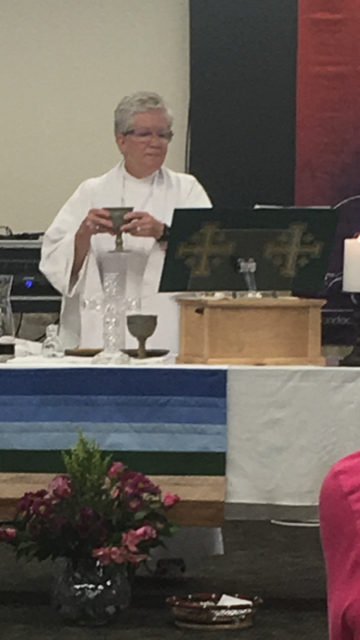
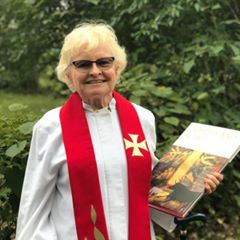
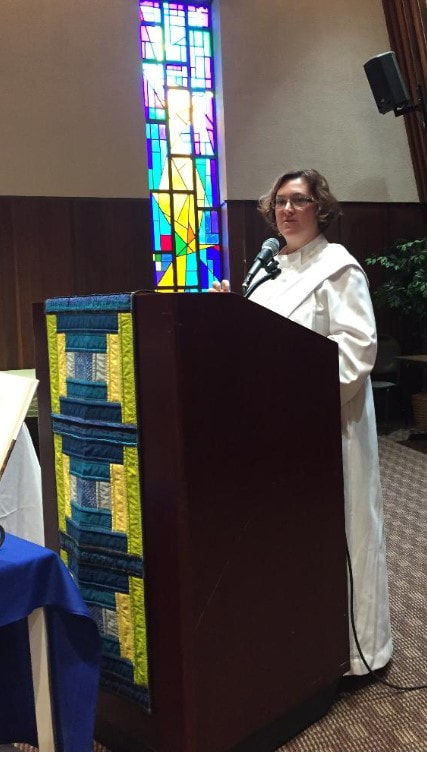
 RSS Feed
RSS Feed
